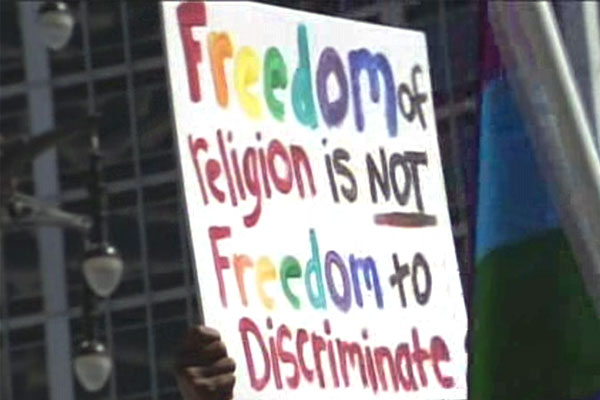
Texas Considers Amendments to Its Religious Freedom Law
- By Hayli Harding --
- 10 Apr 2015 --

After the controversies in Indiana and Arkansas, Texas is considering amendments to its own Religious Freedom laws, facing similar controversy.
Texas lawmakers and business leaders have gathered to publicly object to the proposed constitutional amendments under the claim that not only would it harm the economy, but it would promote anti-LGBT discrimination state-wide. With reference to the uproar in Arkansas and Indiana over their Religious Freedom Restoration Acts, they gathered at a conference on Tuesday to discuss the potential impact of the proposed amendments. According to the opposition, the wording of the amendments are extremely broad, similar to the context of the legislations passed in Arkansas and Indiana, which were modified last week to include protection to the LGBT communities.
Proposed Amendments in Texas for Religious Liberty
There are two amendments that have been recently proposed by state representatives. The first, HJR125, was authored by the State Representative for Fort Worth, Matt Krause. His amendment prevents government entities and homeowner’s associations from infringing on a person’s freedom in religious exercise. The second, authored by the New Braunfels State Senator Donna Campbell, is fairly similar and would prohibit the government from burdening a person or organization in free religion. According to Krause, the amendments to the religious freedom laws aren’t intended to give leeway for LGBT discrimination. He said that it’s one area the proposal is misunderstood, adding that it’d be hard for anyone to justify general discrimination against others. He believes his amendment will provide Texas’ law with constitutional strength.
The proposed amendments have faced some backlash, though it has garnered some support. Opposition primarily comes from business leaders, such as Bill Hammond, the CEO of Texas Association of Business. Hammond said that the law is essentially a “misguided” legislation that would “hurt economic development, tourism and conventions.” He worries that the Super Bowl and NCAA Final Four, scheduled to be hosted in Texas, will be moved elsewhere if the new amendments are passed.
Kathy Miller, the president for the Texas Freedom Network, feels that the amendments are very dangerous, however there are 18 other bills that are even more so dangerous. “They go further than the irresponsible bills that sparked the backlash in Indiana and Arkansas. These are bad bills for Texas,” she said.
Arkansas and Indiana
The Houston State Senator, Rodney Ellis, said that “we’ve all seen the uproar in Indiana” over their Religious Freedom Restoration Act. In agreement with the Democrats, who say that the amendments are broadly worded in a way that makes it open to interpretation in a way that would allow LGBT discrimination to such extent that businesses could deny them service or jobs. Similar to Arkansas and Indiana’s recently amended religious freedom laws, the broad language and lack of explicit prohibition of discrimination create a boiling pot that will likely cause many uprisings and upset across Texas.




















